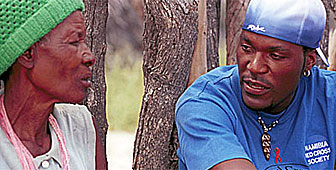Nestlé to fund Red Cross Aids projects in Africa

A decision by Nestlé to help fund Red Cross Aids programmes in Africa highlights the growing need for corporate money in the humanitarian field.
On Thursday, the Swiss food multinational presented the Geneva-based International Federation of Red Cross and Red Crescent Societies with a cheque for SFr 500,000, the first instalment of a SFr3 million ($1.92 million) donation to the African Red Cross Red Crescent Health Initiative (ARCHI) 2010.
Nestlé, named as the official “founding sponsor” of ARCHI 2010, was involved in the launch of the initiative two years ago. The Secretary General of the Federation, Didier Cherpitel, said such corporate support would have a significant impact on fighting diseases such as HIV/Aids.
“The HIV virus is winning at the moment,” Cherpitel said. “New partnerships and ways of working are needed if people are to be reached and an epidemic stopped. This relationship with Nestlé represents potential for the future,” he added.
Currently only five per cent of the Federation’s budget comes from the corporate sector, but that looks likely to increase.
“The future will require a much closer engagement with the corporate sector,” says Alvaro Bermejo, head of the Federation’s Health Department.
Human values
In its corporate business principles, Nestlé says it aims to build a business “based on sound human values and principles”. It is an enthusiastic supporter of UN Secretary-General Kofi Annan’s Global Compact, in which he challenged business leaders to adopt ethical policies to make globalisation benefit everyone.
Despite its avowed social values, Nestlé has frequently been the target of criticism from non-governmental organisations over its behaviour in developing countries. In has even been accused of exploiting the HIV situation, and especially fears of mother-to-child transmission, to promote its own products – a claim denied by CEO Peter Brabeck.
The Red Cross certainly seems to believe Nestlé is an ethical partner. Under Federation’s guidelines, all corporate partners are thoroughly vetted. “I’m sure if we were that bad, the Red Cross would not want to work with us,” says Nestlé Vice-President, Niels Christiansen.
The Vevey-based company will commit SFr3 million over three years for a range of projects addressing urgent health problems in Africa, but in particular, the HIV/Aids epidemic.
Three million Swiss francs may seem a drop in the ocean when faced with the enormity of the Aids pandemic. But it represents a significant and high profile boost to the programme’s coffers, and one that the federation hopes will encourage other enterprises to follow suit.
Enlightened self-interest
“Corporations present in Africa realise that they reacted too late. They only reacted when it started affecting their bottom line,” Bermejo told swissinfo. “Nestlé’s enlightened self-interest should equally apply to others.”
Christiansen admits that it is in the interests of Nestlé to take action: “These are our customers and employees who are dying,” he says.
The average age of Nestlé personnel in Africa has been falling dramatically compared to other regions as a result of Aids. For that reason, the corporation has been working for a number of years with national Red Cross societies and governments on the continent.
“This is an eloquent testimony to what should be happening between multinationals and governments of developing countries,” says Nigerian Ambassador to Geneva Pius Ikpefuan. “It would have been easy for Nestlé to show no social conscience regarding the countries in which it operates.”
10-year programme
Nestlé is the first corporation to contribute to this campaign, and its Chief Executive Officer, Peter Brabeck, encouraged other businesses to “join us in considering how they can best contribute to fighting the HIV epidemic”.
The multinational’s initial SFr 500,000 contribution will be used mainly in Red Cross HIV/Aids prevention programmes in Nigeria, where more than 2.7 million people are believed to be carrying the virus. The rest of the money will be used to support other ARCHI programmes.
ARCHI 2010, which was launched in September 2000, is a 10-year community health programme involving 53 African Red Cross and Red Crescent Societies, national health ministries and United Nations agencies.
The scheme aims to combat not only HIV/AIDS, but also malaria, malnutrition and vaccine-preventable diseases such as polio and measles.
by Roy Probert

In compliance with the JTI standards
More: SWI swissinfo.ch certified by the Journalism Trust Initiative
You can find an overview of ongoing debates with our journalists here. Please join us!
If you want to start a conversation about a topic raised in this article or want to report factual errors, email us at english@swissinfo.ch.